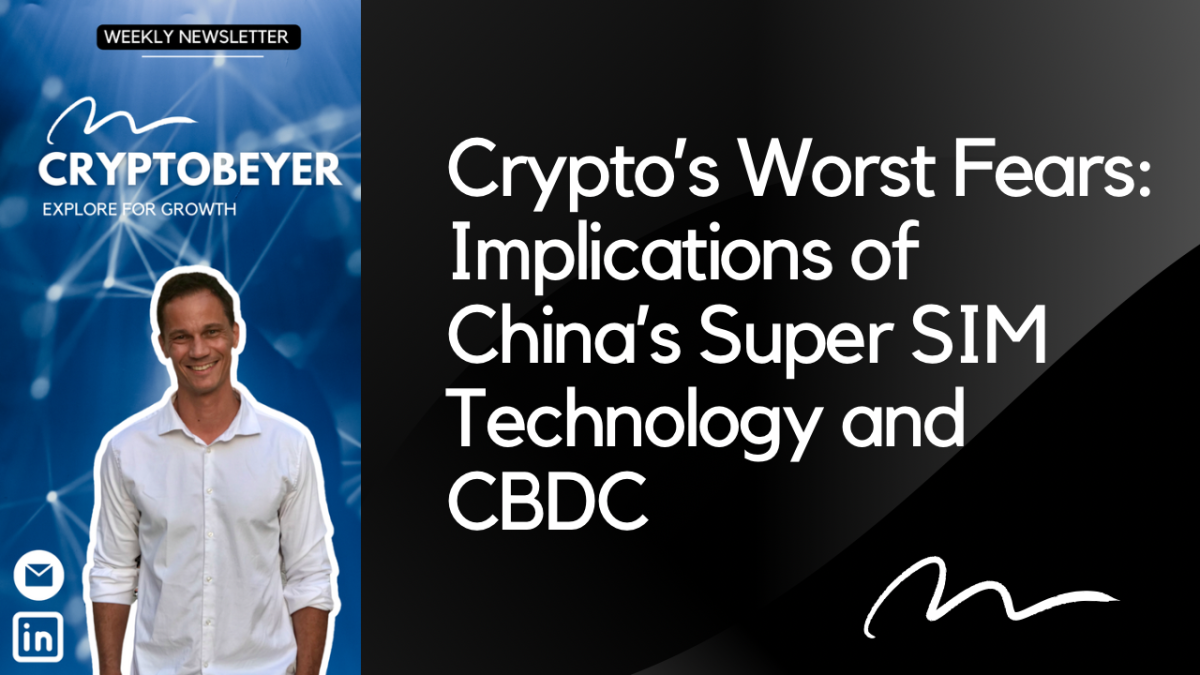China has introduced new "Super SIM" cards that will function as digital yuan wallets, smartcards, and ID cards as part of the nation's CBDC pilot program. The features are innovative but the concerns in the crypto space are considerable. Let’s dive into it.
The new Super SIM card can be manually fitted to existing ID cards or used in cell phones, where they can perform mobile phone functions, as well as doubling as digital ID cards and CBDC wallets. A CBDC is a central bank digital currency like the digital euro or digital dollar. Yes, it’s controlled by the government. Anyway, this SIM card has made it possible for user to have a digital wallet and make transactions between people offline. This makes the digital yuan feel more like physical cash because it does not need the internet to conduct the transaction between two parties. Moreover, the NFC antennas enable digital ID scans for identity verification without the use of the internet. In short, people in China will be able to identify themselves and buy and sell goods and services by using their phone. Offline.
Apparently middle and high school students are particularly in need to make offline digital yuan payments, as the school settings have made it mandatory to use smart ID cards. The digital yuan is being used to pay for bus rides, taxes, and utility services in the country, and its use cases are expected to expand further. Sure, the CBDC in China will include a much-needed hard wallet that is more secure and more reliable than a wallet that is connected to the internet. Blockchain technology and CBDC’s can be used by governments and to create a smooth and secure way to use digital money. Where does the use case stop? Most importantly, where does government control stop?
The integration of digital currencies into everyday devices and transactions could potentially lead to increased surveillance by authorities. The use of these SIM cards as digital wallets and ID cards might enable the government to track spending habits and monitor financial activities more closely, thereby compromising the financial privacy of individuals. In essence when a government has full control of your digital money, they can impose sanctions and even implement various requirements to be able to use your hard-earned cash. In such a situation it’s not your money to spend as you wish. Some money may be allocated to different things and each transaction will be seen by the government (which may or may not be democratically elected).
What is the ultimate plan for the People's Bank of China regarding SIM-based wallets and CBDCs? Is it full control of people’s financial life? The concerns are widespread. Where CBDCs have been introduced before people have tended to be skeptical and not trusting the government. Even refusing to use the digital version of their national currency. To me it seems that the collective fear is valid.
As I have previously mentioned, China is not alone in pushing for a CBDC.
According to the Central Bank Digital Currency Tracker by the Atlantic Council, there are currently 11 countries that have already launched Central Bank Digital Currencies (CBDCs), including the Eastern Caribbean, Nigeria, and China. However, many more countries are exploring the possibility of implementing CBDCs. A study by the Bank for International Settlements found that 86% of central banks are researching CBDCs, with 60% conducting experiments or proofs of concept. The Atlantic Council's CBDC Tracker lists over 130 countries that are exploring CBDCs, including Australia, Canada, India, and the United States. The number of countries exploring CBDCs is expected to continue to grow as more countries recognize the potential benefits of digital currencies. But the concerns are being discussed further throughout the world.
In summary, the centralization of currency control in the hands of the government can potentially lead to increased control over monetary policies, limiting the financial autonomy for businesses as well. The centralized nature of CBDCs could also make them susceptible to potential cyber threats and unauthorized access, which could compromise the financial security of users. This is why the crypto community is screaming out. WE NEED DECENTRALIZATION, NOT CENTRALIZATION.
In fact, decentralization is one of the most important aspects of blockchain technology and cryptocurrency, and a CBDC is fully centralized. CBDCs are digital versions of nation’s money but they are simply not aligned with the values of the crypto community. Crypto was born out of love of freedom.
I would also like to raise the fact that not all government will introduce such a privacy-invasive CBDSs such as digital yuan and its Super SIM card. For example, the US government has privacy concerns, and the European Central Bank has promised to safeguard privacy by limiting how much of people’s financial lives the European system is able to see. It’s not easy, user anonymity cannot be in place since we obviously need to be able to prevent money laundering and to control the amount of money in circulation.
In essence, the solution is to offer an CBDC with privacy up to a point.

